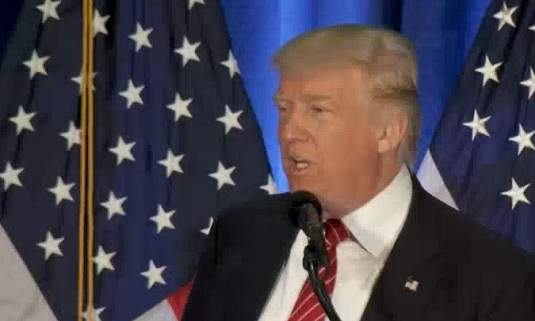-
Tips for becoming a good boxer - November 6, 2020
-
7 expert tips for making your hens night a memorable one - November 6, 2020
-
5 reasons to host your Christmas party on a cruise boat - November 6, 2020
-
What to do when you’re charged with a crime - November 6, 2020
-
Should you get one or multiple dogs? Here’s all you need to know - November 3, 2020
-
A Guide: How to Build Your Very Own Magic Mirror - February 14, 2019
-
Our Top Inspirational Baseball Stars - November 24, 2018
-
Five Tech Tools That Will Help You Turn Your Blog into a Business - November 24, 2018
-
How to Indulge on Vacation without Expanding Your Waist - November 9, 2018
-
5 Strategies for Businesses to Appeal to Today’s Increasingly Mobile-Crazed Customers - November 9, 2018
Trump calls for ‘extreme vetting’ of immigrants to fight Muslim extremism
“Foreign combatants will be tried in military commissions”.
Advertisement
YOUNGSTOWN, Ohio | Donald Trump’s speech on foreign policy Monday focused in large part on his proposal to suspend immigration from risky parts of the world and impose a new system of “extreme vetting” that would subject applicants to questions about their personal ideology. Trump wants to use the immigration system to keep out people who believe the tenets of radical Islamist ideology.
Aside from the proposed ideological tests, Trump said one of his first acts as president would be to create a commission on “radical Islam” that he hopes would “include reformist voices in the Muslim community who will hopefully work with us”.
Trump’s call for an ideological test for migrants was also criticized by Hillary Clinton’s advisor Jake Sullivan in a statement: ‘This so-called “policy” can not be taken seriously.
He contrasted this with today: “Libya is in ruins; Syria is in the midst of a disastrous civil war; in Egypt terrorists have gained a foothold in the Sinai desert; Iraq is in chaos and Isis is on the loose”.
The candidate said that the US would need to temporarily suspend immigration from certain regions until new screening procedures are in place.
Monday, the GOP contender reiterated his stance by saying he would prohibit USA entry for migrants from Muslim nations and assess immigrants from ally nations based on their governments’ commitment to defeating “radical Islam” – a term he’s repeatedly criticized Democrats for, over their failure to use it.
Trump vowed to work “very closely” with NATO, sidestepping previous criticism of the North Atlantic Treaty Organization after saying that a Trump presidency would not automatically leap to members’ defense. “He’s talked about sending ground troops, American ground troops – well, that is off the table as far as I am concerned”, she said in Scranton, Pa.
Since Mr Trump castigated the alliance it has, according to him, changed its policies and it now has a new division focused on terrorist threats.
Trump’s unprecedented call in December 2015 “for a total and complete shutdown of Muslims entering the United States until our country’s representatives can figure out what is going on” is still listed on his campaign website, and he has yet to personally denounce the controversial proposal.
Nobody would argue that there were no mistakes in U.S. foreign policy towards the Middle East.
Trump on Monday proposed putting in place an ideological test for admission to the United States and temporarily suspending visa processing from regions “that have a history of exporting terrorism”.
In the Cold War, we had an ideological screening test.
“Extreme vetting” – at this point it’s more of a branding exercise than an actual policy, the sort of proposal you’d expect to emerge from a Doritos marketing meeting, not a presidential campaign.
He said that only those who comply with the American values should be permitted to immigrate.
Trump on Monday is also expected to outline a new immigration policy proposal under which the US would stop issuing visas in any case where it can not perform adequate screenings.
The Republican presidential candidate also criticized Hillary Clinton over the millions of dollars he said the Clinton Foundation accepted from countries “where being gay is an offense punishable by prison or death”.
“How can Trump put this forward with a straight face when he opposes marriage equality and selected as his running mate the man [Mike Pence] who signed an anti-LGBTI law in IN?” a Clinton spokesman asked.
Trump recognized this political reality early on in his campaign for the party nomination for president.
Biden’s folksy demeanor and ability to connect with working-class voters is considered an asset for Clinton particularly among blue-collar white male voters who lean toward her Republican rival.
“In June, 49 Americans were executed at the Pulse nightclub in Orlando”, said Trump.
Advertisement
President Barack Obama was pointed in his reaction to Trump’s comments, saying they were another sign of the Republican nominee’s “lack of preparedness” on foreign policy.





























